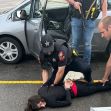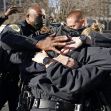Newly identified public records show that the Nashville Christmas day bomber Anthony Warner had an explosives user permit that was issued to him in November 2013. That permit expired in 2016.
Questions Arise About Warner's Past
As news about Warner and his motive continues to develop, so does the investigation into what he used to build the bomb. The latest developments show that Warner had crossed paths with the police within the past year and a half before the bombing happened. In August 2019, Warner's former girlfriend Pamela Perry came into contact with the police after her attorney Raymond Throckmorton called the police to Perry's abode because she was making suicidal threats. When police arrived at Perry's home, they found Perry on her porch with two unloaded firearms. The incident report later revealed that the firearms belong to Warner.
During this interaction with police, Perry informed police that her boyfriend Anthony Warner had made statements about building bombs in an RV that was on his property. The police wrote down this information in the incident report. In the report, police state that they went to Warner's home but did not get a response when they knocked on the door. Police were able to observe the RV parked in the backyard but because they could not enter the residence or the backyard, they were unable to look into the RV. Police also noted security cameras and wiring attached to an alarm system around the home.
Perry's attorney Throckmorton, who also represented Warner, shared with police that Warner had made comments in the past regarding bomb-making and the military. Throckmorton expressed that he believed Warner had the ability to make a bomb.
The police followed up by sending the incident report to police supervisors as well as the Hazardous Devices Unit. On August 22, 2019, the incident report was forwarded to the FBI where agents checked to see if Warner had any ties to the military. Their analysis showed that he did not. Four days later, the Hazardous Devices Unit got in contact with Warner's lawyer to follow up. During the follow-up, Warner did not grant permission for his RV to be searched. Because there was no official crime that had taken place, the RV was never searched and the investigation into the bomb claims stopped there.
After having been informed of the incident report from over a year ago, the mayor's office shared a statement that read in part, “We must learn from this tragedy. We have a responsibility to take a deep look at what law enforcement could or should have done better. Then, we must be transparent with Nashville about those findings. Chief Drake has committed to getting those answers through an open, professional process and to giving me a full report."
Authorities Work to Piece Together Bomb Components
Authorities are continuing to search for evidence that may lead them to exactly how the bomb that rocked downtown Nashville was created. Through the process, authorities are searching for bomb parts and vehicle parts left in the rubble that can point them in the direction of what was used to craft the bomb. Based on the level of destruction, many experts point to the materials used as "high explosives." High explosives are considered to be explosive materials reserved for demolition and mining work. Other analysts have speculated that a massive amount of "low explosives" could cause just as much damage.
Worries Over Ease of Access to Explosive Materials
In Tennessee, individuals who handle explosives need to have the proper licensing, licensing which Warner did not have. However, not having the proper licensing does not stop an individual from getting their hands on materials to create an explosive device. Some of the suspected materials used in the explosion include ammonium nitrate and smokeless powder. Both of these materials are easily accessible online. Retired ATF investigator David Hyche shared with a local news station that anyone can purchase small quantities of these materials online and stay under the radar. Former FBI criminal profiler Clint Van Zandt also shared that anyone can build an explosive device using a recipe pulled off of the internet.
The sheer accessibility to explosive materials has left many residents dumbfounded. One local business owner, Lior Rose, shared with the local news outlet, “It’s very concerning that someone – just a regular person – can get so much material to build a bomb on this scale.”
As investigators continue searching for a motive and piecing together the bomb materials used, it remains unclear whether or not Warner acted with a bigger agenda in mind. FBI public affairs officer Darrell DeBusk has confirmed that the bomber did share “materials” with acquaintances across the nation that depicted his views. Agents are continuing to explore what these “materials” detail.






